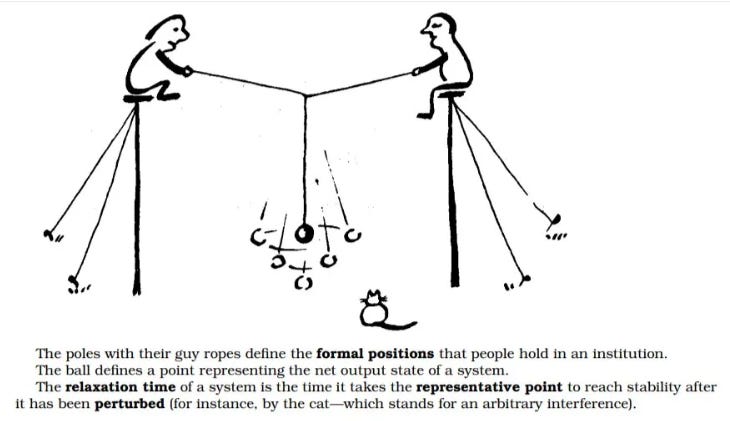BRIEFLY NOTED: For 2024-04-30 Tu
Iron Dome missile defense; using GPTs & LLMs in economic research; very briefly noted; not the Efficient Market Hypothesis; & The Neofascist Five Supreme Court Justices: America's Downward...
Iron Dome missile defense; using GPTs & LLMs in economic research; very briefly noted; not the Efficient Market Hypothesis; & The Neofascist Five Supreme Court Justices: America's Downward Political Spiral Continues...; READING: Annette Gordon-Reed on Understanding Sally Hemings's Life; HOISTED FROM THE ARCHIVES: Reading Will MacAskill’s "What We Owe the Future"; & BRIEFLY NOTED: For 2024-04-27 Sa…
ONE IMAGE: Iron Dome:
ONE VIDEO: Kevin Bryan: A User's Guide to GPT & LLMs for Economics Research:
Very Briefly Noted:
Neofascism: Noah Smith: ‘Years ago we said "Republicans kill PUPPIES!!!" as a lame joke. Today it's just another headline… <https://twitter.com/Noahpinion/status/1784384149757039078>
Economics: Dani Rodrik: ‘I’m sure it will be a great disappointment for the advocates to learn that industrial policy is no magic bullet. Can you imagine the IMF <https://twitter.com/IMFNews/status/1784193614295552053> summarizing another study as “central bank independence is no magic bullet…”.? That’s how your ideology shows… <https://twitter.com/rodrikdani/status/1784235367631036689>
Eric Levitz: Tell the truth about Biden’s economy: ‘American workers’ wages have been rising faster than prices for more than a year now. Their nation’s economy, meanwhile, is the envy of the wealthy world…. Affirming… working class… misperceptions of the Biden economy does it no favors. To the contrary, validating the public’s economic pessimism risks shifting American macroeconomic policy in an anti-labor direction. But this hazard is lost on many in the commentariat… <https://www.vox.com/24134257/biden-economy-inflation-wages-interest-rate>
Addison del Mastro: : ‘Some folks interpret YIMBY as being about handouts—they seem to have trouble distinguishing “build more housing and raise the supply so prices come down” with “give me a house!” They’re wrong, but there are some housing advocates who in my opinion blur that line…. I sometimes get the sense that conservatives think the role of public policy is to reinforce the unfairness of life… see the effects of our policy failures as inherent slings and arrows of life, and begin to feel that there is some sort of “cheating” involved in remedying them…. But breaking out the salad spinner is morally neutral. It’s using the right tool for the job. Building housing and driving down our artificially high prices is likewise using the right tool—the market—for the job of aligning our housing market with our broader economy… <https://thesdeletedscenes.substack.com/p/housing-yimbys-and-luxury-preferences>
Economic History: Johan Fourie: Our long walk to freedom at thirty: ‘62 per cent of inequality in South Africa in 1975 could be explained by the gap between black and white incomes; by 1996 this had fallen to 33 per cent…. The first thirteen years of democracy, from 1994 to 2007, stand in stark contrast to the next thirteen…. Local politics… would transform the South African economy from one that was imperfect but optimistic to one that was decidedly bleak…. Thabo Mbeki… replaced by Kgalema Motlanthe succeeded by Jacob Zuma…. Rapid increase in the size of government…. Action plans… notably the ambitious and admirable National Development Plan (NDP)… were paid little more than lip service…. Political cronies… appointed to positions of power…. Many state-owned enterprises collapsed. The most significant of these was Eskom…. A country that does not have a reliable source of energy… cannot grow. And that is exactly what happened. In Zuma’s first term of office, per capita GDP growth averaged less than 1 per cent; in his second term, which lasted from 2014 to 2018 (when he, too, was recalled by the ANC), per capita GDP growth was negative…. The average South African became poorer…. Extracting rents became the government’s priority. The poorest, who depend most on a capable government, lost out, and their lives became a daily struggle for food, jobs and service delivery. Nelson Mandela’s long walk to economic freedom went down a wrong path. Let’s hope we can find our way back… <https://www.ourlongwalk.com/p/our-long-walk-to-freedom-at-thirty>
Lucian K. Truscott IV: ‘I am the white Jefferson descendant who first invited my Sally Hemings cousins to the family reunion at Monticello in 1999 and pursued for four years thereafter the goal of getting our Hemings cousins welcomed into the white side of the family. We failed, but in championing the cause of the descendants of Sally Hemings and Thomas Jefferson to be accepted as great grandchildren of Jefferson the same way I am, I got to know dozens and dozens of my cousins on the Hemings side of the Jefferson family. Reading these two takes, one by my good friend Annette Gordon Reed, I was reminded that there are almost as many opinions on the relationship between Sally Hemings and Thomas Jefferson as there are descendants of that union who are alive today. Some think that over the 36 years they were together at Monticello before he died that they were in love. Some see Sally as a victim of rape. And there are many opinions in between. As Annette points out about what happened between them in Paris, only two people know what went on between them: Jefferson and Hemings. Annette is right that there are many hints—Jefferson made sure Sally's brothers and their children were educated—there are letters between Jefferson and John and Peter Hemings, for example, and certainly of their offspring it's obvious that Madison was educated. And this from the man who wrote at such length in "Notes on the State of Virginia" about the inferiority of the Black race. You could call Jefferson by the time of his death the King of Irony. At his bed when he died was my 5h great grandmother, his daughter Martha, and Sally Hemings—clearly the two most important women in his life… <https://braddelong.substack.com/p/reading-annette-gordon-reed-on-understanding/comment/55025056?r=d0v>
Central Country: Economist: How Xi Jinping plans to overtake America: ‘Digital twins, nuclear fusion and the small matter of fixing China’s economy…. Xi has a plan… “new productive forces”…. At China’s stage of development, economies typically pivot towards services. Yet the government’s heart lies elsewhere…. China’s 14th five-year plan, which spans 2021-25, promised to maintain manufacturing’s share of gdp, which had declined from almost a third in 2006 to just over a quarter in 2020…. “What China really wants to be is the leader of the next industrial revolution,” says Tilly Zhang of Gavekal Dragonomics, a consultancy. That will require it to upgrade traditional industries, break foreign strangleholds on existing technologies and forge a new path in industries of tomorrow… <https://www.economist.com/finance-and-economics/2024/03/31/how-xi-jinping-plans-to-overtake-america>
MAMLMs: Matt Levin: What can the dot-com bubble teach us about the future of AI?: ‘Nvidia’s stock has been soaring… pick and shovels… betting on the infrastructure that underlies a new technology…. “There seemed to be a railroad bubble… one a decade after the Civil War,” said Brad DeLong, an economic historian at the University of California, Berkeley. 19th-century investors rightly sensed that railroads were about to revolutionize the economy, and still lost their shirts. But just like the telecom companies that laid internet cables in the 1990s, many of which went bankrupt, the failed railroad companies gifted the economy some helpful plumbing. “In the aftermath of each railroad bubble, we were left with an awful lot of railroads that had been built by investors who had gone bankrupt,” said DeLong… <https://www.marketplace.org/2024/04/18/what-can-the-dot-com-bubble-teach-us-about-the-future-of-ai/>
Moral Responsibility: Fred Clark (2023): Merry Christmas From Woke C.S. Lewis: ‘[C.S. Lewis:] “We ought to read the psalms that curse the oppressor;… with fear. Who knows what imprecations of the same sort have been uttered against ourselves? What prayers have Red men, and Black, and Brown and Yellow, sent up against us to their gods or sometimes to God Himself? All over the earth the White Man’s offense “smells to heaven”: massacres, broken treaties, theft, kidnappings, enslavement, deportation, floggings, lynchings, beatings-up, rape, insult, mockery, and odious hypocrisy make up that smell…”. I don’t think Lewis really is quite woke here. He is, rather, only half awake…. The problem here is that Lewis remains preoccupied with “our” spiritual status…. If his penitence consists merely in “rubbing his nose in it” and then shambling around feeling vaguely guilty and hoping to be forgiven then such a man is still half asleep in bed. If our actions and our history require forgiveness, then we need to get up, get out of bed, get dressed, and get to work making amends… <https://www.patheos.com/blogs/slacktivist/2023/12/24/merry-christmas-from-woke-c-s-lewis/>
Journamalism: Brian Buetler: Are Democrats (Finally) Breaking Up With The Mainstream Media?: ‘Years of frustration have begun to boil over, but with few alternative journalism institutions to turn to, Democrats have turned instead to celebrity interviewers…. President Biden…. “The defeated former President has made no secret of his attack on our democracy. He has said he wants to be a ‘dictator on day one’, and so much more. He tells supporters he is their “revenge” and “retribution.” When in God’s name have you heard another president say something like that?… I’m sincerely not asking of you to take sides but asking you to rise up to the seriousness of the moment; move past the horse-race numbers and the gotcha moments and the distractions… and focus on what’s actually at stake…”. No punchline omitted. Just raw and well-earned frustration with the assembled journalists partying it up in the long shadow of fascism with their remaining colleagues—the ones whose jobs have been lost to a long right-wing war on journalism…. Politico’s exposé on the deteriorating relationship between Biden and the Times dwells on the Times’s vindictive anger at Biden for refusing to grant the paper of record an exclusive sit-down interview…. As James Fallows and David Roberts have observed, the questions presidents face from interviewers and interlocutors outside the political-media industry are often more interesting and substantively informative than the ones that come from members of the White House press corps. More ‘what would your plan do?’ and ‘why do you want to do that?’, less ‘what about your gaffes?’ and ‘aren’t you very old?’ and ‘isn’t Hunter your fault?’… <https://www.offmessage.net/p/democrats-breaking-up-with-mainstream-media?r=d0v>
SubStack NOTES:
Economics: But this is not the Efficient Market Hypothesis!:
Market Sentimemnt: Alpha Letter #4: Factor Investing: ‘The current Fama French model is the combined effort of 40 years of research…. The past six decades of data show that five factors explain 95% of the differences in returns between diversified portfolios (all figures are annualized).
Market Risk (MKT-RF): The market beat one-month treasury bills by 5.37%.
Size (SMB — small minus big): Small stocks beat large stocks by 2.04%
Value (HML — high minus low): Value stocks beat growth stocks by 2.68%
Profitability (RMW — robust minus weak): Highly profitable companies outperformed weakly profitable companies by 2.8%.
Investment (CMA — conservative minus aggressive): Companies that were conservative in asset growth beat aggressive growers by 2.93%.
This shows us, in simple terms, that even if we believe in the Efficient Market Hypothesis, certain factors would get us better results through long-term exposure than if we just stuck to market-cap-weighted index funds… <public.hey.com/p/GBfPdtftX8QVccGVscvaD4…>
The EMH is that the market is efficient—given people’s rational preferences for more stuff with a declining marginal utility of wealth, the typical investor cannot boost expected returns above the market average without widening the distribution of their returns so much that declining marginal utility of wealth makes the game not worth the candle. The four additional factors—small vs. big, value vs. growth, profitable vs. not-so-much, & conservative vs aggressive asset growth—are not pieces of but rather modes of failure of the EMH.
And as for factor (1): market risk? This looks to me like the biggest failure mode for the EMH of all, although some people do contest it. More on that anon…










In the matter of "how your ideology shows", one could characterize the Fama-French program as "research" or, just as defensibly, "fiddling with model parameters".
I do object to describing a factor model as "explaining" variance in a text intended to be read by the general public. This term is perfectly intelligible - taken for granted - by economists, but is likely to mislead the general reader. And perhaps, subconsciously, it misleads the professional economist too. Suppose, arguendo, that you accept the five FF factors as stable, persistent, and fundamental. The thing to *explain* is why. For example, if value stocks really outperform growth stocks, why is that? An example that has the correct form of an explanation is "value is defined as book-to-market ratio, and there is regression to mean". Another is "the cash flows from value stocks are more evenly distributed than those from growth stocks, therefore they have a higher interest rate convexity". Yet another is "value stocks outperform growth stocks in bad states of the world; therefore the stochastic deflator values them more, ceteris paribus." *Research* would attempt to determine whether and to what degree these explanations are correct. Of course, if the effect is emergent and transient after all, that would be research founded on sand, wouldn't it.
Anyway, "in my factor decomposition of the covariance matrix, factor X accounts for Y% of the total variance" does not have the correct form of an explanation.
'‘Nvidia’s stock has been soaring… pick and shovels… betting on the infrastructure that underlies a new technology…. “There seemed to be a railroad bubble… one a decade after the Civil War,” said Brad DeLong, an economic historian at the University of California, Berkeley. 19th-century investors rightly sensed that railroads were about to revolutionize the economy, and still lost their shirts. But just like the telecom companies that laid internet cables in the 1990s, many of which went bankrupt, the failed railroad companies gifted the economy some helpful plumbing. “In the aftermath of each railroad bubble, we were left with an awful lot of railroads that had been built by investors who had gone bankrupt,”'
I am not clear who the target of this analogy is. The railroad companies went bankrupt, but did the steel manufacturers of the rails? Some telecom companies followed, but did the manufacturers of the fiber optic cable, routers, etc. also go bankrupt? The suppliers of picks and shovels, and other supplies did well during the gold mining booms, but as long as they had other businesses, did they go under? Or did they do well by being middlemen, causing stress on the manufacturers of those supplies when the booms ended?
In the tech industry, some of the big failures were the computer manufacturers - DEC, Silicon Graphics, and Sun Micro, to name just 3. IMO, they failed because they had expensive products that could be replaced by cheaper "good enough" competitors. But the chip makers all seem to have done well and remain active. While Warren Buffett famously said he would never invest in companies requiring fabs as they never created enough free cash flow, TSMC has done very well, and ASML that supplies the lithography equipment remains highly profitable. Intel's fortunes have faded for similar reasons to the computer manufacturers. CISCO did well in the internet boom, but despite leaner times after the dotcom collapse is still doing well.
Is Nvidia like TSMC or Intel/Sun? At this time they have no serious competitors for their technology. Arguably their technology could replace a lot of CPU-based systems in data centers. Their graphics cards are often the most expensive part of any desktop/gaming system. So while they are going gangbusters during the AI boom (with a valuation reflecting it), are they doomed to collapse when the boom eventually slides into the "trough of disillusionment" or will demand for their innate parallel processing approach see steady growth of their chips and systems? As computing resources are now a significant energy sink, technologies that reduce power consumption from ARM chip technology to GPUs is a welcome development.
After a bust, what technology remains useful at firesale prices? Railroad lines were torn up or left rusting, replaced with shiny new roads. It would ne nice to think that all that "dark fiber" is now lit up, but is it? Are all those comsat swarms in LEO going to be useful if SpaceX at al fail to make enough money from subscribers, or will they just be allowed to burn up on reentry without replacement reducing the swarm's capabilties?
IOW, is the basic idea too simplistic and reality far more nuanced, especially when technology is rapidly developing?